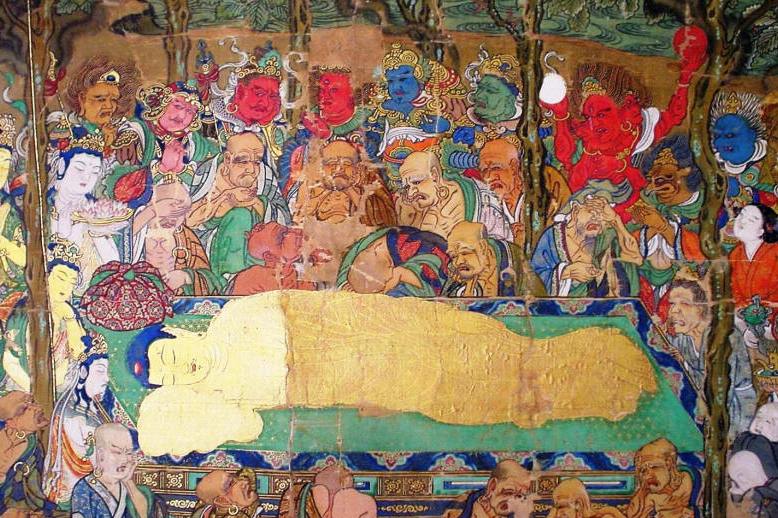READINGS FOR TODAY'S DHARMA TALK ARE BELOW IN THIS THREAD.
WELCOME to our Memorial & Celebration of NEHAN-E, (Pari-Nirvana) the traditional day to mark the historical Buddha's death and passing from this visible world. This is also a day for each of us to remember in our homes those family and friends who have gone before. As well, we particularly mark the passing of Nishijima Gudo Wafu and Rempo Niwa Zenji ...
During this Zazenkai, we will commence with SPECIAL CHANTS & a CEREMONY to recall our parents, grand-parents, siblings, our relatives near and distant, all our ancestors reaching back through the generations, and our dear friends and other cherished ones who have passed.
This Zazenkai will be netcast LIVE 8am to noon Japan time Saturday morning (that is New York 6pm to 10pm, Los Angeles 3pm to 7pm (Friday night), London 11pm to 3am and Paris midnight to 4am (early Saturday morning)) ... and visible at the following link during those times ...
... to be visible on the below screen during those times and any time thereafter ...
LIVE ZAZENKAI NETCAST at GOOGLE+ IS HERE:
CLICK ON THE TAB ON LOWER RIGHT FOR 'FULL SCREEN
https://plus.google.com/events/c851f...tnnm1nd42749nk
Dharma talk audio / podcast episode:
http://treeleaf.podbean.com/e/februa...hour-zazenkai/
To mark this time, our Ceremony at the start of the Zazenkai will include a chanting of “The Verse of Homage to Buddha's Relics, Shariraimon” and Heart Sutra in Chinese-Japanese (to mark our "roots"). Words and details are HERE, please print out if you wish.
Our sitting schedule for the 4-hour gathering will be as follows ...
00:00 - 00:50 CEREMONY (SHARIRAIMON in ENGLISH / HEART SUTRA in JAPANESE) & ZAZEN
00:50 - 01:00 KINHIN
01:00 - 01:30 ZAZEN
01:30 - 01:40 KINHIN
01:40 - 02:30 DHARMA TALK & ZAZEN
02:30 - 02:40 KINHIN
02:40 - 03:15 ZAZEN
03:15 - 03:30 KINHIN
03:30 - 04:00 METTA CHANT & ZAZEN, VERSE OF ATONEMENT, FOUR VOWS, & CLOSING
For this special Zazenkai, a statue of the reclining ‘Buddha Entering Parinirvana’, and a Plaque dedicated to all past Generations of Zen Ancestors, will be given special prominence on the Altar.
As always, we close with the 'Metta Chant', followed at the end with the 'Verse of Atonement' and 'The Four Vows'.
I STRONGLY SUGGEST THAT YOU POSITION YOUR ZAFU ON THE FLOOR IN A PLACE WHERE YOU ARE NOT STARING DIRECTLY AT THE COMPUTER SCREEN, BUT CAN GLANCE OVER AND SEE THE SCREEN WHEN NECESSARY. YOUR ZAFU SHOULD ALSO BE IN A POSITION WHERE YOU CAN SEE THE COMPUTER SCREEN WHILE STANDING IN FRONT OF THE ZAFU FOR THE CEREMONIES, AND HAVE ROOM FOR BOWING AND KINHIN.
ALSO, REMEMBER TO SET YOUR COMPUTER (& SCREEN SAVER) SO THAT IT DOES NOT SHUT OFF DURING THE 4 HOURS.
I hope you will join us ... an open Zafu is waiting. When we drop all thought of 'here' 'there' 'now' 'then' ... we are sitting all together!
Gassho, Jundo







 Reply With Quote
Reply With Quote ) by various Zen Priests and others, some well known and some not. The writing of a poem at the time of one's death, reflecting on life and the nature of death in an impermanent, transitory world, is an old tradition in the Japanese, Korean and Chinese Zen World (most of the following translations and commentary are by
) by various Zen Priests and others, some well known and some not. The writing of a poem at the time of one's death, reflecting on life and the nature of death in an impermanent, transitory world, is an old tradition in the Japanese, Korean and Chinese Zen World (most of the following translations and commentary are by 










